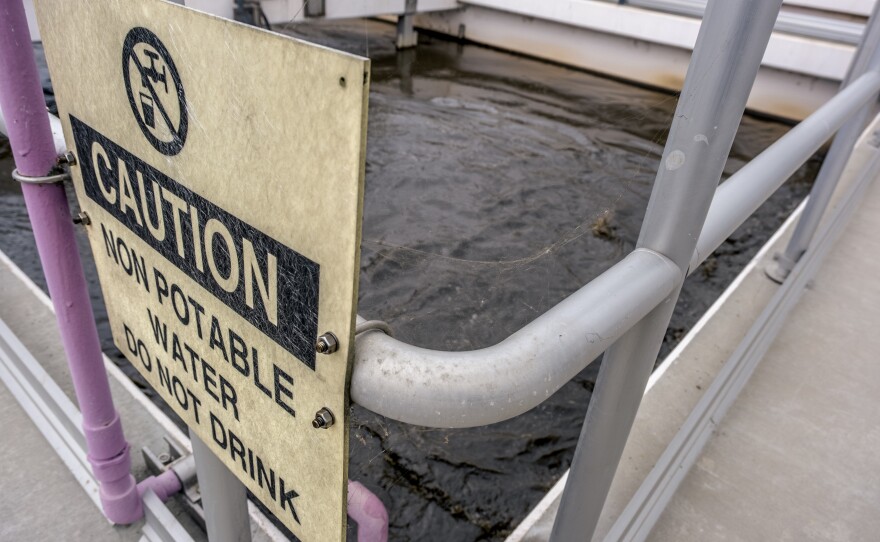One day after Gov. Gavin Newsom visited the U.S.-Mexico border, San Diego's local congressional delegation Tuesday marked the beginning of an extensive rehabilitation project at a border wastewater treatment plant.
The South Bay International Wastewater Treatment Plant has been blamed by county leaders, at least in part, for the sewage outflow at the border causing an ongoing public health crisis.
"From awful sewage smells to closed beaches, toxic sewage pollution has hurt our communities for too long," said Rep. Juan Vargas, D-San Diego. "These upgrades to the South Bay International Wastewater Treatment Plant are a critical step forward in the fight to combat this pollution."
Untreated wastewater from Mexico's Tijuana River crosses the border into the United States and washes out to sea just south of Imperial Beach. The bacterial buildup from the raw sewage in the wastewater has necessitated the closure of South Bay beaches almost without interruption for three years.
A total of $400 million will be used to double the treatment plant's capacity. If and when Mexico acts on their side of the border, the project could prevent around 90% of the untreated wastewater from reaching the ocean, according to the delegation.
"For years I've called the cross-border sewage crisis one of the biggest environmental catastrophes in the Western Hemisphere, but it threatens more than nature, it threatens public health," said Rep. Scott Peters, D-San Diego. "Today, we are in the best place we've been in decades to fix this horrible problem.
"We've secured hundreds of millions of dollars to rehab and expand this treatment plant, and the highest levels of government in the U.S. and Mexico are more aware than they've ever been about how dire and harmful the problem is."
Vargas, Peters and Rep. Sara Jacobs, D-San Diego, were joined by officials from the International Boundary and Water Commission.
"The Tijuana River Valley has flowed with sewage and pollution longer than I've been alive, but I'm so glad we're making bigger and faster progress than ever before," Jacobs said. "Once this project is completed, the capacity of the South Bay International Wastewater Treatment Plant will double, helping to improve our health and safety and keep our businesses and beaches open."
The announcement came a day after Newsom visited the treatment plant and met with county leaders about the border pollution crisis.
"Pollution in the Tijuana River Valley is the number one environmental health crisis impacting our region, and Governor Newsom coming to San Diego for today's briefing shows his steadfast commitment to our communities," Vargas said Monday. "I have said time and again that the only way we will solve this crisis is by working together. Our collaboration with Governor Newsom, as well as our federal partners, is critically important.
"We're working to put forward our best collective efforts to restore and protect our region."
Last week, the Board of Supervisors voted to pursue legal action against corporations the plaintiffs claim are responsible for the sewage pollution crisis.
According to a statement from Supervisor Terra Lawson-Remer's office, county legal counsel every 90 days "must present the Board of Supervisors updates and available opportunities to pursue lawsuits against any potentially responsible parties for damages caused to the Tijuana River Valley, Estuary and Marine Preserve, and the surrounding neighborhoods."
Earlier in the month, Lawson-Remer joined a group of residents from Imperial Beach suing Veolia Water Operating Services and Veolia Water North America-West — entities who operate the treatment plant.
The move is not without precedent, as the county successfully sued opioid manufacturers to the tune of more than $100 million, and is in the process of suing a ghost gun company.
Veolia, a French concern, was also involved in the Flint, Michigan, water crisis and has been in litigation for other public health crises in Oklahoma, Pennsylvania and Colombia.
In a statement, Veolia described the allegations as "meritless," and said the majority of sewage and associated odors and pollution come from Tijuana and do not enter the wastewater treatment plant.
The San Diego City Council recently approved a resolution asking for a national emergency regarding the sewage outflow at the border. The council had approved 31 years of consecutive extensions of a local state of emergency on the situation.
The council first declared a state of emergency because of the pollution — ranging from raw sewage to industrial runoff — in 1993. Imperial Beach put out a similar declaration in 2017, followed by the county in 2023.
Since October 2018, the United States section of the International Boundary and Water Commission has catalogued more than 200 billion gallons of toxic waste coming into the United States through the Tijuana River Valley.
According to a city document, the commission has spent just $4 million of $40 million allocated for infrastructure maintenance at the plant.







